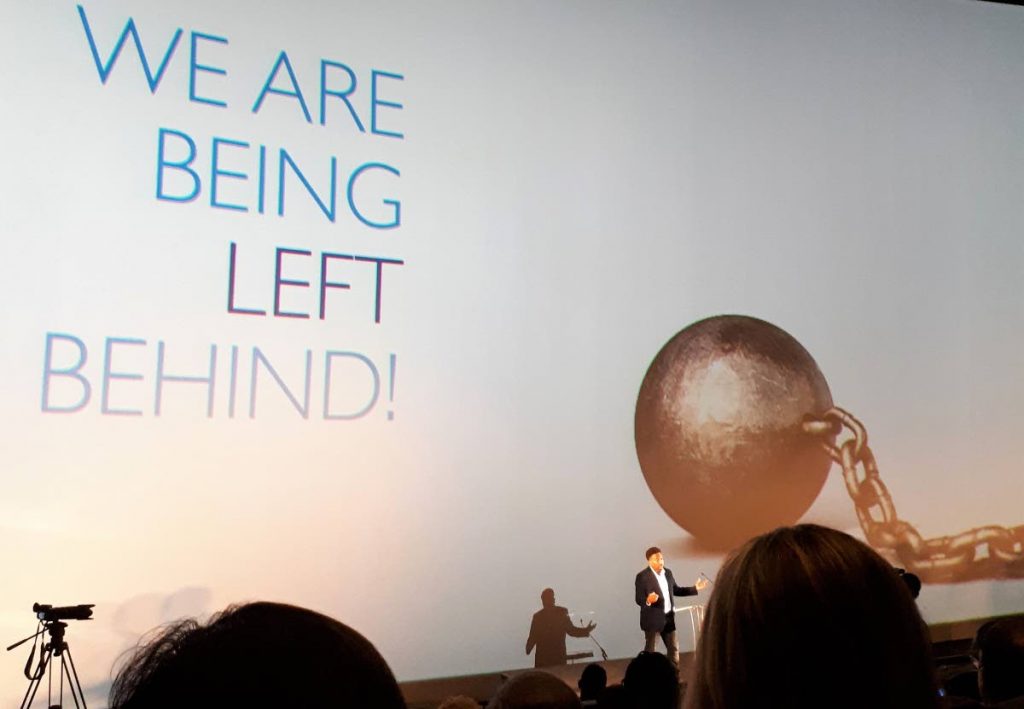Digital debate

A concept-focused showdown between the baby boomers and the millennials was the highlight of A Digital Caribbean – the final session of the 49th annual meeting of the Caribbean Development Bank (CDB), Hyatt Regency, Port of Spain, last week.
The session which comprised three separate panel discussions was opened by a heated, but friendly, showdown between Barbados-based founder of Bitt Inc Gabriel Abed and founder and chairman of Intelligence Capital Professor Avinash Persaud.
The disagreement between the two was a running theme throughout the session – exemplifying the two approaches existing throughout the globe, whether it is best to make incremental progress by finding a middle ground between analog and digital, or updating legislation to facilitate a new paradigm of digitalisation.
While Persaud argued for maintenance of the systems which are currently in place with progressive integration of new technologies, Abed held to his stance that technology is advancing at a rate much too fast for that approach to make the optimum impact. Abed said instead of maintaining systems which have resulted in the region being left behind, it is best essentially do an overhaul – full digitalisation which would increase productivity, efficiency and transparency. He also made reference to the fact that the current mode of operation which calls for employees to take a day off from work to go to the bank or carry out other transactions are at the expense of a country's gross domestic product (GDP). Transactions which, he says, can all be done by the tap of a screen in other parts of the world.

FILE PHOTO/VIDYA THURAB
The discussion – moderated by director at ICT Pulse Consulting Ltd Michelle Marius – saw Abed discussing how dominant financial institutions generally have too many requirements, which leaves the majority of the population unbanked or unable to access the benefits offered by financial institutions, while Persaud defended the position that financial institutions seek to protect people from investing what they cannot afford to lose.
This issue was later explored in the panel discussion involving WiPay founder Alwynd Wayne and Minister of Economic Affairs, Barbados Marsha Caddle. Wayne spoke of WiPay being presented as an ideal facility which created the opportunity for the unbanked population to digitise their cash for online purchases. This, he said, was presented to the government in August 2018, after which, in a matter of months, legislation was amended to facilitate this new way of financial exchange.
WiPay's system for court services, CourtPay, was launched last August and the legislation – The Electronic Payments Into and Out of Court Act 2018– was assented to on October 1.
While Caddle commended the creation of WiPay, she, however, noted that the region on a whole ought to move away from seeking to make incremental steps in digitalising financial and government systems, and begin the process of taking exponential leaps through legislation which would ensure analogue modes of operation fades.
She said, "In June, last year, we started with the town and country planning process. We looked at the process and realised a lot of the solutions would be technology solutions. It is not that we started off with the intention of digitalising the government, but we looked at what we were doing and realised in order to deliver this in a more efficient way, we would have to make it accessible online." This, she said, resulted in the e-planning platform which links online applicants and all the decision-making bodies such as the Ministry of Economic Affairs and Investment, the town and country offices and other agencies for communication and transfer of data without compromising privacy.
This, she said, saves time and energy, eliminating the need for documents to be sent to a number of different locations. In addressing the widely discussed issue of technology rendering some jobs dormant, Caddle said these changes will instead encourage greater thrusts toward having people who carry out some manual functions to gain greater technology-oriented skills – therefore keeping up with the quickly changing way of how things are being done globally.


Comments
"Digital debate"